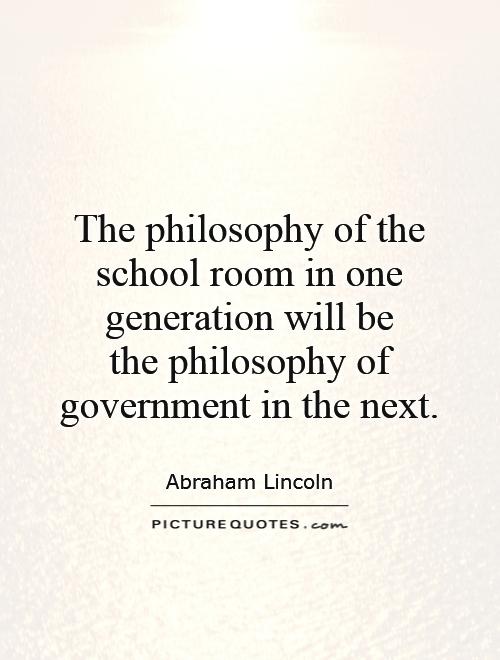The philosophy of the school room in one generation will be the philosophy of government in the next

The philosophy of the school room in one generation will be the philosophy of government in the next
Abraham Lincoln, the 16th President of the United States, is often remembered for his leadership during the Civil War and his efforts to abolish slavery. However, Lincoln also had a deep understanding of the importance of education and its impact on society. One of his famous quotes, "The philosophy of the school room in one generation will be the philosophy of government in the next," reflects his belief in the power of education to shape the future of a nation.Lincoln recognized that the values and beliefs instilled in young minds in the classroom would ultimately influence the decisions and policies of future leaders. He understood that education was not just about acquiring knowledge, but also about developing character, critical thinking skills, and a sense of civic responsibility. Lincoln believed that a well-rounded education was essential for creating informed and engaged citizens who could contribute positively to society.
In Lincoln's time, education was not as widely accessible as it is today. Many children did not have the opportunity to attend school, especially in rural areas. Lincoln himself had only a year of formal education, but he was a voracious reader and self-taught individual. Despite his limited schooling, Lincoln recognized the importance of education in shaping the future of the nation.
Lincoln's belief in the power of education to influence government can be seen in his policies and actions as President. He signed the Morrill Land-Grant Acts, which provided federal funding for the establishment of public universities in every state. These institutions were intended to promote agricultural and mechanical education, as well as military training, to prepare students for careers in industry and government.
Furthermore, Lincoln's Emancipation Proclamation and support for the 13th Amendment, which abolished slavery, were rooted in his belief in equality and justice. These actions reflected his commitment to upholding the principles of democracy and human rights, which he believed were essential for a just and prosperous society.












 Friendship Quotes
Friendship Quotes Love Quotes
Love Quotes Life Quotes
Life Quotes Funny Quotes
Funny Quotes Motivational Quotes
Motivational Quotes Inspirational Quotes
Inspirational Quotes